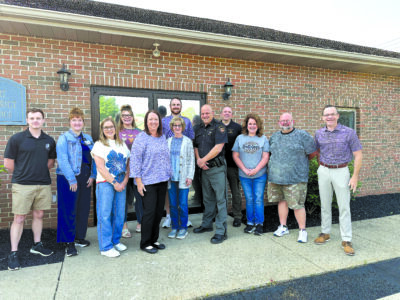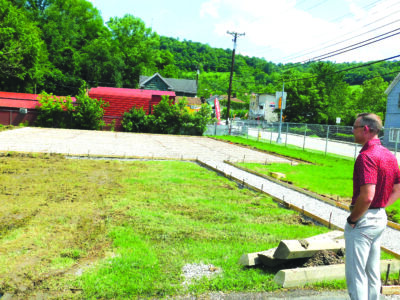Heritage Port ceremony completes Wheeling Juneteenth celebrations

Photo by Emma Delk Macedonia Baptist Church Voices of Praise provide entertainment during the Wheeling Juneteenth Ceremony.
WHEELING — Local and state leaders shared ruminations on the past, words of wisdom for the present and encouragement for the future during the annual Wheeling Juneteenth Ceremony.
The holiday commemorating the end of slavery in America on June 19, 1865, was celebrated in Wheeling at Heritage Port on Wednesday.
Residents bore the heat to hear speeches and songs centered on the theme of this year’s Juneteenth celebrations: “Our Ancestors’ Wildest Dreams.”
The ceremony began with a speech by Wheeling Human Rights Commission member Unique Robinson-Murphy, who noted that her “ancestors could not have dreamt her up.” Robinson-Murphy shared that despite a difficult childhood with an incarcerated father and a drug-addicted mother, she was able to become “exactly what she set out to be.”
After acquiring her degree from Marshall University in 2015, Robinson-Murphy began her careere as a social worker for Ohio County Schools. She said that now, she can serve as a source of guidance for not only her own children but also help students across the county become who they want to be.
“Every day I’m advocating for someone or something to improve the quality of life for my community and its people,” Robinson-Murphy said. “As I move along in this world, I never let where and what I come from be forgotten or downplayed. I take the things I’ve been through and don’t let them define me, and instead, I use those things to fuel my motivation.”
The next speaker to take the stage was comic book author and Bethany College Student Nathan Rouse, who also emphasized the importance of inspiring and “fueling the dreams of the next generation.” Rouse said his comic book “The Legacy of Jupiterman” can serve as a “breeding ground for imagination and inclusion.”
“Through stories, we can inspire the next generation to dream of a better world and believe in their own potential to make a difference,” Rouse said. “When we look out to the sky, we see limitless possibilities.
“Our ancestors paved the way for us. Now it’s our turn to shape the world with hope and vision,” Rouse continued. “Let’s strive for progress and look beyond what we see today.”
Men of Change Vice President Hayden Cook also emphasized the importance of paving the way for the next generation in his speech. He shared an anecdote about a black sharecropper in Alabama during the 1920s putting “all his life savings on the table,” which was only $10, to help build a school.
“The sharecropper said as he placed down his life savings, ‘I want to see the children of my grandchildren have a chance,'” Cook recalled. “We have made tremendous gains in the last 100 years since that story took place, but we still have more to achieve. The disparities in our education system can be disheartening, but they also present opportunities and hope.”
West Virginia NAACP President Darryl Clausell and former state senator Owens Brown emphasized during their speeches that attendees should not become complacent in their fight for equality.
Brown noted that younger generations may become “lost in the wilderness of social media,” but that older generations must make sure that children are not “imprisoned” by social media platforms “in a state of confusion and depression.”
“If Martin Luther King Jr. had been asleep, he would have never seen the promised land,” Brown said. “We are looking at the future, and the future is now, so on this day of June 19, 2024, for Wheeling, West Virginia, let’s all commit ourselves to building a better future for all people.”
Wheeling Mayor Glenn Elliott was the last speaker to take the stage, with Wheeling Juneteenth Committee Chairman Ron Scott Jr. noting that this would be Elliott’s last Juneteenth speech as mayor after speaking at every Juneteenth ceremony held in the city.
“Glenn included in his speech at the first Juneteenth an acknowledgment of Wheeling’s role in the slave trade, and I thought that was incredibly brave,” Scott said while introducing Elliott. “What stood out to me is he didn’t have to do that, it wasn’t an election year. He did it because he felt like it was the right thing to do, and at the absolute most he thought it was necessary, and at the absolute least he thought it was needed.”
In addition to his speech being the last time he would speak as mayor during a Juneteenth ceremony, Elliott noted that this was likely the last speech he would ever give as mayor since his term ends on June 30.
In his speech, Elliott looked back on the creation of the Wheeling Juneteenth Committee in 2018 during the planning of celebrations for Wheeling’s 250th anniversary. He said that as plans were made for those festivities, he emphasized the need to look at the “good and ugly” in the city.
“There’s certainly nothing more ugly in our history than slavery,” Elliott said. “Wheeling was never a major slave city, but we were a major hub in the slave trade. I felt at the time in 2018 we should acknowledge that, and I’m so grateful to members of the Juneteenth Committee for taking on that charge.”
Elliott noted that although no one in the crowd on Wednesday “bears any direct responsibility for slavery,” they all still had the responsibility to educate themselves and their children about “slavery’s evils and its lingering effects.”
“As I said at this event last year, put yourself in someone else’s shoes to try to understand that a holiday like Juneteenth is not to pander and it’s certainly not ‘woke,’ whatever that word means,” Elliott said. “It is a very critical ingredient to healing racial wounds that continue to beset this great nation.”
Wednesday’s ceremony wrapped up the Juneteenth-centered events in the city that began on Sunday. Scott noted that the event added a “ceremonial piece” to the celebrations. He said it was important to not only celebrate the city’s progress, but also to look backward and remember more “somber events” of the past.
“I think sometimes Wheeling’s smallness gets used against us,” Scott added. “People think that since we’re so little, we couldn’t have had an impact on world history or something like the slave trade. Though we are just a small pocket of the country, we have pieces and parts of almost everything. It’s important to ensure that we’re also a piece and a part of the healing process of everything.”





